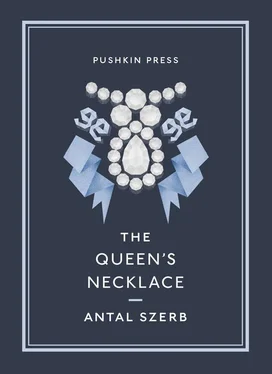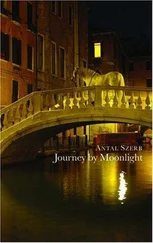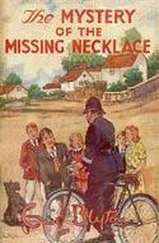To the ‘taking’ of such power, Rohan felt in his more optimistic moments, there was only one obstacle: the Queen’s anger. The King he probably considered a quantité négligeable , as he usually was. It was not the King’s favourite but the Queen’s who exercised power. For a child of the age of Pompadour and Du Barry the notion of a favourite carried essentially erotic implications. In France, the real ruler was the person who ruled the Queen’s heart. And why should that not be him, Rohan, the Belle Eminence , as his followers called him? Mazarin, with far less manly appeal and grand-seigneurial charm, had once ruled his queen, Anne of Austria, and through her, France.
But a person who falls under the spell of erotic dreams does not remain immune to their power for long. Rohan had dreamt for so many years that the Queen was in love with him that he ended up falling desperately in love with her himself. In this he showed some taste, especially when we consider who he was, and who the Queen was, and we can forget the shades of Mazarin and the other great cardinals. Marie-Antoinette was both young and one of the most beautiful women in France. Rohan, however, was approaching fifty, and in those days, as we all know, people aged more rapidly and died younger: the average life expectancy in France was twenty-eight years and nine months. Perhaps Rohan was seized by Torschlusspanik , the sexual passion bordering on madness that is triggered by approaching old age.
And here is something else. The varieties of sexual attraction can be analysed in terms of sociological type. There are some people who can love only those of lower standing than themselves — gentlemen of birth who pursue female servants, and ladies of rank who adore coachmen. There are those whose passions are strictly confined to members of their own stratum, and those who can love only those from a bracket higher than their own — people in whose minds sex and ambition are inseparably fused. These are the main groups, and most of us fall into one of them or another. And if Rohan was indeed one of those who could love only their superiors, then there was just one woman of higher rank than himself — the Queen. He was like the very tall man whose fate is to be attracted only by women taller than himself. In Rohan’s adoration of the Queen there may well have been a similar element of fatal compulsion.
Neither contemporary sources nor later historians like Funck-Brentano raise the question of Rohan’s actual feelings for her. But there is one piece of information well known to scholars that supports my theory, psychologically improbable as it might seem. Mme Campan records the following story, which makes very little sense unless we assume that Rohan was indeed in love with her.
In the summer of 1782 Archduke Paul Petrovics, the son of Catherine the Great who became Paul I of Russia and later went mad, came to Paris with his wife. They travelled incognito, as the Count and Countess North — a poetic name indeed. The Queen gave a banquet in their honour at Trianon, and the park was illuminated. Rohan bribed the concierge (a ‘janitor’ in the sense that Mme Campan was a ‘chambermaid’? Indeed not, but a genuine concierge) to let him into the park, claiming he wanted to see the lights after the Queen had left for Versailles. So he hid himself in the porter’s lodge. But he failed to keep his promise to go out only after the Queen’s departure, and when the man’s attention was distracted he slipped out into the park. He was ‘in disguise’, but that consisted only of a greatcoat beneath which his purple stockings were clearly visible. Once in the park, he stood, thus strangely attired, and with a ‘face of mystery’, as Mme Campan writes, peering out, from two separate locations, at the royal family and their train of attendants. Marie-Antoinette was deeply shocked and wanted to sack the porter the next day, but Mme Campan successfully intervened on his behalf.
What was His Eminence hoping for in the park? Was it to reveal himself in the confident expectation that her heart would melt when she saw him? Rohan was not that stupid: he had a paunch, he was no longer young, and the ludicrous disguise would hardly have advanced his cause. The only possible explanation is that he desperately wanted to see the Queen, and that was why he had gone there.
But whatever the case, there is no doubt that he was driven by the desire, verging on compulsion, to diffuse the Queen’s anger and win her favour. This is the second such idée fixe in the story, according to Carlyle, the first being Boehmer’s with his necklace. And when two such obsessions come together, a force comes into being that could destroy a nation. All that is needed is for them to combine with a third.
And that was how Jeanne de la Motte found Rohan when she met him at Saverne, the Bishop of Strasbourg’s country seat. The old manor house had burnt down in 1779, but Rohan had rebuilt it in fashionable pomp and splendour and fitted it out, again in the taste of the time, with collections of natural history and art, and splendid libraries. The number of his guests had not diminished since his days in Vienna. He lived like a prince. They came in such numbers, from all over Germany and France, and even from the Court at Versailles, that often there was no room for them all in the mansion, despite its seven hundred awaiting beds. “There was no noblewoman of such good family that she did not dream of Saverne,” wrote a contemporary. “The hunts were especially magnificent.” Six hundred peasants drove the game into the gentlemen’s guns, with the women following on horseback or in carriages. At one o’clock the entire party assembled for luncheon, in a marquee erected in some picturesque spot on the banks of a stream. So that the pleasure should be shared by everyone, there were even tables waiting on the lawn for the peasantry: it was Rohan’s wish that every one of them should have a pound of meat, two pounds of bread and half a bottle of wine. At Saverne they certainly enjoyed to the full what Talleyrand calls ‘the sweetness of life’.
It was to this fairytale castle that Jeanne de la Motte, dissatisfied and inwardly eaten up as ever, came with her husband. Her great patron Mme de Boulainvilliers introduced her to the Cardinal and commended her to his favour. She told him her story while he listened in rapt silence — which is hardly surprising, given the details that might have come from a novel. The unvarnished realities of a defenceless life, the bitter taste of poverty, would have been particularly fascinating to a man whose own days had been passed in the most cushioned elevation, and to whom the woes of ordinary life were comprehensible only as some sort of exotic and compelling tale. And Jeanne knew supremely well how to present her tale with steadily mounting effect. On a number of occasions her later writings reveal — it is quite noticeable — that she had practised extensively and this was the form she finally evolved. One can imagine her using her spare moments to rehearse it over and over again, honing it down to one particular version with its ever-increasing drama.
So Rohan listened, and believed everything. He usually believed what people told him. Two days before his arrest, Cagliostro persuaded him that he would be dining with Henry IV, though he would not actually see his illustrious guest. If one were writing a play on the subject one would have to ignore everything else and focus on this trait alone, because in the entire drama of the necklace it is the most significant. He showed the most extraordinary, indeed unbelievable, gullibility. The most problematic aspect of the whole affair, Funck-Brentano tells us, was the degree of credulity we are required to attribute to him. It is the most improbable feature in the whole improbable story — but it is undeniable.
Читать дальше












